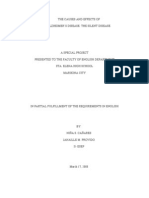0 ratings0% found this document useful (0 votes)
509 viewsControl Structures in Java
Control structures in Java allow programmers to control the flow and order of program execution. There are decision control structures like if/else that allow selecting code blocks based on conditions, repetition control structures like while and for that repeat code execution, and branching statements like break and continue that change the flow of loops. Common control structures are if/else for conditional execution, while/for loops for repetitive execution, and switch for selecting blocks based on multiple conditions.
Uploaded by
Nina CanaresCopyright
© Attribution Non-Commercial (BY-NC)
We take content rights seriously. If you suspect this is your content, claim it here.
Available Formats
Download as DOC, PDF, TXT or read online on Scribd
0 ratings0% found this document useful (0 votes)
509 viewsControl Structures in Java
Control structures in Java allow programmers to control the flow and order of program execution. There are decision control structures like if/else that allow selecting code blocks based on conditions, repetition control structures like while and for that repeat code execution, and branching statements like break and continue that change the flow of loops. Common control structures are if/else for conditional execution, while/for loops for repetitive execution, and switch for selecting blocks based on multiple conditions.
Uploaded by
Nina CanaresCopyright
© Attribution Non-Commercial (BY-NC)
We take content rights seriously. If you suspect this is your content, claim it here.
Available Formats
Download as DOC, PDF, TXT or read online on Scribd
You are on page 1/ 2
Control Structures in Java
- allow us to change the ordering of how the statements in our programs are executed
● Decision Control Structures - which allow selection of specific sections of code to be executed
- if
- if-else
- if - else if
- switch
● Repetition Control Structures – which allow executing specific sections of code a number of
times
- while
- do-while
- for
● Branching Statements – which allow redirection of program flow
- break
- continue
- return
Syntax and Examples
if-statement has the form:
if ( boolean_expression ) statement; or
if ( boolean_expression )
{statement 1;statement 2;}
-where: boolean _expression is either a boolean expression or boolean variable
Ex:
int grade = 68;if ( grade > 60 )
System.out.println ("Congratulations! ") ;
if-else statement has the form:
if ( boolean_expression )
{statement 1;statement 2;. . .}
else
{statement 3;statement 4;. . .}
Ex:
int grade = 68; if ( grade > 60 )
System.out.println ("Congratulations! ");
Else System.out.println ("Sorry you failed") ;
if-else-if statement has the form:
if ( boolean_expression1 )statement 1;
else if ( boolean_expression2 )statement 2;
else statement 3;
Ex:
int grade = 68;if ( grade > 90 )
{System. out. println ("Very good! ") ;}
else if ( grade > 60 )
{System. out. println ("Very good! ") ;}
else
{System. out. println ("Sorry you failed") ;}
switch statement has the form:
switch( switch_expression )
{case case_selector1:
statement1;//
statement2;//block 1
break;
case case_selector2:
statement1;//
statement2;//block2
break;
:
default:
statement1;//statement2;//block n}
-where: switch _expression - is an integer or character expression
case_selector1, case_selector2 and so on - are unique integer or character constants.
Ex:
public class Grade { publicstatic void main( String[] args )
{ int grade = 92;5
switch(grade)
{ case 100: System.out.println( "Excellent!" ); break;
case 90: System.out.println("Good job!" );break;
case 80: System.out.println("Study harder!");
break;
default: System.out.println("Sorry, you failed."); } }}
while loop has the form:
while ( boolean_expression )
{statement 1;statement 2;. . .}
Ex:
Int x = 0;while (x<10)
{System. out. println (x) ;x++;}
do-while loop has the form:
do {statement 1;statement 2;. . .}
while ( boolean_expression ) ;
Ex:
int x = 0;
do {System. out. println (x) ;x++;}
while (x<10) ;
for loop has the form:
for(InitializationExpression;LoopCondition;StepExpression)
{statement1;statement2;. . .}
-where: InitializationExpression -initializes the loop variable
LoopCondition - compares the loop variable to some limit value
StepExpression - updates the loop variable.
Ex:
int i;
for ( i = 0; i < 10; i++ )
{System. out. println (i) ;}
You might also like
- Media and Information Literacy: Quarter 1 - Module 3No ratings yetMedia and Information Literacy: Quarter 1 - Module 315 pages
- Japl-F-Wi-008-Journey Management Log Sheet 1No ratings yetJapl-F-Wi-008-Journey Management Log Sheet 11 page
- Tourism Promotion Services I: Shaireena Lee M. TianaNo ratings yetTourism Promotion Services I: Shaireena Lee M. Tiana71 pages
- Tourism Value Chain Mapping Methodology - April 2019 1No ratings yetTourism Value Chain Mapping Methodology - April 2019 157 pages
- Philippine Tourism Geography & Culture: A Modular Worktext For Tourism 1100% (1)Philippine Tourism Geography & Culture: A Modular Worktext For Tourism 122 pages
- Prelim Reviewer Applied Business Tools and TechnologiesNo ratings yetPrelim Reviewer Applied Business Tools and Technologies18 pages
- Pre-Tour/arrival Procedures: Four Stages of Tour Guiding67% (3)Pre-Tour/arrival Procedures: Four Stages of Tour Guiding2 pages
- Barriers To Cultural Diversity in Hospitality and Tourism Organization0% (1)Barriers To Cultural Diversity in Hospitality and Tourism Organization9 pages
- Pimsat Colleges: Basic Terminology For Lodging FascilitiesNo ratings yetPimsat Colleges: Basic Terminology For Lodging Fascilities3 pages
- The Impact of People, Process and Physical Evidence On Tourism, Hospitality and Leisure PDFNo ratings yetThe Impact of People, Process and Physical Evidence On Tourism, Hospitality and Leisure PDF15 pages
- Tour Guiding Process and Skills: Module ThreeNo ratings yetTour Guiding Process and Skills: Module Three34 pages
- 03 The Accommodation and Food and Beverage SectorsNo ratings yet03 The Accommodation and Food and Beverage Sectors8 pages
- Lesson 7-Guest Relation in Hospitality & Tourism Industry (Part 1)100% (1)Lesson 7-Guest Relation in Hospitality & Tourism Industry (Part 1)16 pages
- The Course Structure For Front Office Services NC II Is Divided Into The Following ModulesNo ratings yetThe Course Structure For Front Office Services NC II Is Divided Into The Following Modules2 pages
- Chapter 1. The Problem and Its BackgroundNo ratings yetChapter 1. The Problem and Its Background3 pages
- Chapter 2. Review of Related Literature and StudiesNo ratings yetChapter 2. Review of Related Literature and Studies1 page
- The Causes and Effects of Alzheimer's Disease: The Silent Disease100% (2)The Causes and Effects of Alzheimer's Disease: The Silent Disease35 pages
- NEW AUS SITXCOM010-Manage Conflict-Written Test V2.1No ratings yetNEW AUS SITXCOM010-Manage Conflict-Written Test V2.114 pages
- Starcraft - (2000) Revelations - Michy Neilson PDFNo ratings yetStarcraft - (2000) Revelations - Michy Neilson PDF12 pages
- Arjen de Korte - To Teach or Not To Teach GrammarNo ratings yetArjen de Korte - To Teach or Not To Teach Grammar9 pages
- AI and The Art of Instructional Design - 5 Layers of Expertise For 2024 - UpdatedbNo ratings yetAI and The Art of Instructional Design - 5 Layers of Expertise For 2024 - Updatedb163 pages
- (EzSensor HD (HI) IOS-U20VF U20IF) Install and User Manual - ENG - V 1.4 - 160708No ratings yet(EzSensor HD (HI) IOS-U20VF U20IF) Install and User Manual - ENG - V 1.4 - 16070872 pages
- Instant ebooks textbook (Ebook) Encyclopedia of Thai Massage: A Complete Guide to Traditional Thai Massage Therapy and Acupressure by David Roylance, Pierce Salguero ISBN 9781844095636, 1844095630 download all chapters100% (2)Instant ebooks textbook (Ebook) Encyclopedia of Thai Massage: A Complete Guide to Traditional Thai Massage Therapy and Acupressure by David Roylance, Pierce Salguero ISBN 9781844095636, 1844095630 download all chapters81 pages



































































































